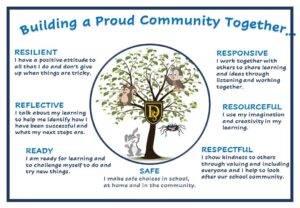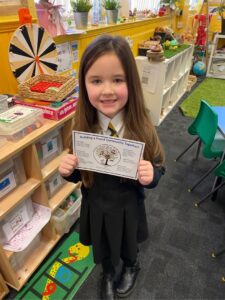Promoting Positive Relationships and Behaviour at Dysart Primary School
At Dysart Primary School we firmly believe that strong, trusting relationships are central to positive behaviour. This includes relationships between both adults and children and amongst peer groups.
The Dysart Primary approach to building positive behaviour and relationships is below.
Dysart Primary School Vision, Values and Aims

Underpinning all approaches to relationships and behaviour is our understanding of 4Rs
Promoting Positive Relationship and Behaviour Skills
At Dysart Primary School we firmly believe that strong, trusting relationships are central to positive behaviour. This includes relationships between both adults and children and amongst peer groups.
We expect all staff to:
- Be consistent, positive and calm
- look for positives and focus on praising/celebrating positive behaviour first
- teach children how to be ready, respectful and safe
- communicate clear expectations
- be relentless about routines – line up inside and outside the building, walking through the school, calm transitions
- use scripts to de-escalate
We use a range of approaches to help children to develop the skills to have positive relationships with others and resolve things when they go wrong. We recognise that nurturing approaches support children’s wellbeing and their ability to regulate emotions.
- Kitbag is used from Nursery to Primary 7
- Rights Respecting Class Charters are created with the children every August and referred to regularly. The charters lay down the expectations for pupils behaviour in terms of their rights and responsibilities. These are linked to our school values and wellbeing indicators.
- Curriculum promoting positive behaviour and relationships permeates our whole school curriculum. We recognise that we have to teach and model good behaviour and not simply expect it. Benchmarks within Health and Wellbeing focus in on teaching children strategies to help them deal with their emotional, mental and social wellbeing. We use Cool in School and the RSHP Programme to help children develop healthy relationship skills and to respond in a range of situations
- P7 Buddies look after and support P1 children in the first few months at Primary School.
- P6 and P7 Peer Mediators, help children to resolve differences they have in the playground and come to a resolution. Children can go to a peer mediator for help if they can’t agree on a game or if they have had a small disagreement with friend or if they have a problem they need help with. The Peer Mediators have had two full days of training by Relationship Scotland to support them with this role.
- Every classroom has a calm area to provide a space for children to regulate when they need it
- We teach children different ways to regulate their emotions in different ways, e.g. breathing, mindfulness and movement
- Children have regular opportunities to be outdoors – we know this is good for wellbeing
- Playground zones set up to encourage children to collaborate with friends of different ages and play in different ways
- P6 and P7 Sports Ambassadors lead playground games for other children
- Playpod sessions support children in developing skills to problem solve and work together with others
- Lunchtime clubs indoors which provide a more predictable and structured lunchtime experience
- Breakfast Café is free to all
Celebrating Achievement
We celebrate children’s achievements in different ways:
- Seesaw journals show learning progress and achievements
- Verbal praise and feedback from class teachers and the wider staff team
- Achievement certificates at assemblies or a special mention at assembly
- Dysart Positivity Postcards are sent home with a child when they show the school values
- Children are invited to bring in achievements from home to celebrate in class or at assemblies Achievements from outside school are celebrated at assemblies.
- Children are given house points when they show the school values. These are collected all year round with a winning house announced at the end of the year.

Restorative Approaches
We use restorative approaches as part of a planned response to relationships and or behaviour difficulties.
Restorative approaches can change the emotional atmosphere in a school and lead to more positive relationships between pupils and staff.
A restorative approach may include having a restorative conversation. These conversations may happen during the school day and staff will use restorative language and questions to allow children and young people to understand the impact of their behaviour.
Examples of questions used might include
- What happened?
- What were your thoughts at the time?
- What have been your thoughts since?
- Who has been affected by what happened?
- How have they been affected?
- What do you need to happen now?
Some children choose to use a Fix it Folder. This is a visual resource that helps children to recognise how they could have behaved differently and how to repair things with people they have upset. Nursery children and younger children particularly enjoy this approach.
Restorative Approaches help children to see things from different perspectives, to take responsibility for their actions, identify how they could have managed situations better and repair relationships. Children might choose to do something kind to show they are sorry. They might offer help the janitor to pick up litter if they have broken something when they were upset.
More serious incidents require staff to meet with parents/families where appropriate and plan next steps. We may ask parents to provide support in school if their child’s behaviour is unsafe.
Increased supervision/structure
Staff may plan for a child/children to have increased supervision or structure around playtimes or lunchtimes if a child is showing through their behaviour that they need more practice/support/structure at lunch and breaktimes or before/after school.
Additional Support
For children who require additional and intensive support a range of approaches can be used including:
- Agreed regular contact between home and school
- Additional levels of structure and supervision around playtimes and transition times for children
- Additional levels of structure and supervision in class
- Additional check-ins to support regulation (Ready, Respectful, Safe)
- Individual de-escalation plans
- Risk Assessments to reduce unsafe behaviours
- Support from Support for Learning Teacher to reduce barriers to learning or wellbeing
- Group support, for example, Wellbeing groups, Normalising Anxiety Programme, Seasons for Growth
- Working with our partners to provide additional support to children and their families, e.g. Enable, Pupil Support Service, Educational Psychologist, The Cottage Family Centre, YMCA, Health Visitors, Educational Psychologist, Primary Mental Health Workers, Putting People First Team, Young Carers, Family Support Service
- Parenting Support, for example, Online Access Therapies Fife, Incredible Years Group.
- If a child’s behaviour cannot be safely de-escalated by staff in school, parents/carers will be contacted to come and support the child in school
- Staff, child and parent focus group worked collaboratively to create a Positive Relationships at Dysart Poster.


You must be logged in to post a comment.